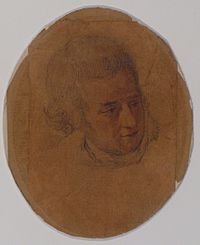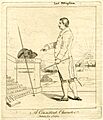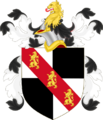Thomas Howard, 3rd Earl of Effingham facts for kids
Quick facts for kids
Thomas Howard
|
|
|---|---|
| Earl of Effingham | |

1781
|
|
| Born | 13 January 1746 |
| Died | 19 November 1791 (aged 45) |
| Noble family | House of Howard-Effingham |
| Spouse(s) | Catherine Proctor |
| Issue | none |
| Father | Thomas Howard, 2nd Earl of Effingham |
| Mother | Elizabeth Beckford |
Thomas Howard was a British nobleman and army officer. He was born on January 13, 1746. He became the 3rd Earl of Effingham. Before 1763, people called him Lord Howard. His father was Thomas Howard, the 2nd Earl, and his mother was Elizabeth.
He joined the army when he was young. In 1762, he became an ensign and a lieutenant in the Coldstream Guards. These were important army ranks. By 1765, he was promoted to captain in the 5th Regiment of Foot.
Contents
A Stand Against War
Thomas Howard is most famous for a brave decision. He resigned from the army because he disagreed with the war. This was the war against the American colonies. His action was widely known.
Honored by Americans
People in America remembered his stand.
- In 1775, they named a ship called a galley after him.
- Later, in 1777, a larger warship, the USS Effingham, was also named in his honor.
- Several places in the United States bear his name. These include Effingham, New Hampshire, Effingham County, Georgia, and Effingham County, Illinois.
Fighting in Another War
Before the American war, Thomas Howard had other experiences. In 1770, when he was 24, he volunteered to fight. He joined the Russian army. This was during the Russo-Turkish War. He saw the Turkish fleet destroyed at Chesma Bay.
Why He Resigned
In 1775, Thomas Howard learned his army unit would go to America. He wrote a letter to Lord Barrington. Lord Barrington was the Secretary of State for War. In his letter, Howard explained his reasons for leaving the army.
He wrote: "I cannot, without reproach from my conscience, consent to bear arms against my fellow subjects in America in what, to my weak discernment, is not a clear cause." This meant he felt it was wrong to fight against the American colonists. He did not believe the war was fair or right.
A Dramatic Moment
He also spoke about his resignation in the House of Lords. This was a part of the British Parliament. To show how strongly he felt, he pulled out his officer's sword. Then, he threw it onto the floor of the room. This was a very powerful way to show his protest.
His Views on the Conflict
Before the American Revolution started, Thomas Howard tried to stay neutral. He did not like either side.
- He disagreed with the British Government's harsh rules. He also disliked their taxes on the colonies.
- He also did not like that the colonists were fighting back.
However, he believed the war would hurt both Great Britain and America. Even though he resigned, he still loved the army. He also felt loyal to King and country. He said he would even die to protect Britain from attack.
Later Life and Career
Despite his public protest, Thomas Howard was allowed to rejoin the army. This happened in 1779. Britain was worried about a possible invasion. In 1782, he was promoted to Lieutenant-Colonel.
Diplomatic Possibilities
In 1785, a London newspaper reported something interesting. It said he might become a minister to the United States. This would have been like an ambassador. It would have been a way to return the favor after John Adams came to Britain. However, he did not go to America. George Hammond became the first envoy there instead.
Governor of Jamaica
Thomas Howard died when he was 45 years old. He was serving as the Governor of Jamaica at the time. This was a very important job. He passed away just over a month after his wife. They did not have any children. His title then went to his brother, Richard.
Images for kids
-
Arundel Castle, the ancestral home of the Howard family.
 | Bessie Coleman |
 | Spann Watson |
 | Jill E. Brown |
 | Sherman W. White |




